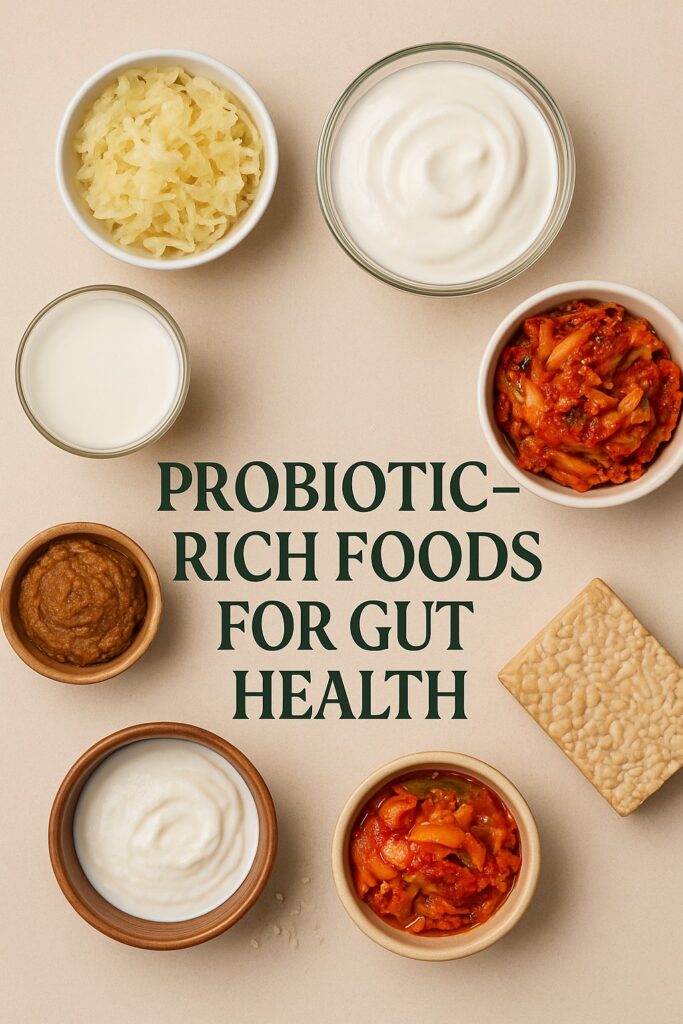Probiotic-Rich Foods for Gut Health
Maintaining a healthy digestive system is essential for overall wellness. One of the most effective and natural ways to support your gut is by consuming probiotic-rich foods for gut health. These foods contain beneficial bacteria that enhance digestion, boost immunity, and may even improve your mood. Fortunately, adding them to your daily routine is simple and delicious.

What Are Probiotics and Why Are They Important?
Probiotics are live microorganisms that offer health benefits when consumed in adequate amounts. They primarily live in your gut, where they help balance the intestinal flora. This balance is vital because it prevents harmful bacteria from overgrowing. Probiotic-rich foods for gut health can play a crucial role in maintaining this harmony.
Moreover, a balanced gut microbiome supports nutrient absorption, reduces inflammation, and strengthens the immune system. In fact, research shows that gut health is closely linked to various aspects of physical and mental well-being.
Top Probiotic-Rich Foods for Gut Health
Adding a variety of probiotic-rich foods for gut health into your diet doesn’t have to be complicated. Here are some top choices that are widely accessible and highly beneficial.
1. Yogurt: A Creamy Probiotic Powerhouse
Yogurt is perhaps the most well-known probiotic food. It contains live cultures like Lactobacillus and Bifidobacterium, which support gut flora. Additionally, yogurt is rich in calcium and protein, making it a nutritious snack or breakfast option. However, always check the label to ensure it contains “live and active cultures.”
2. Kefir: Fermented Milk with a Kick
Kefir is a tangy, fermented milk drink packed with a variety of probiotic strains. Unlike yogurt, it also includes beneficial yeasts, which may help combat certain harmful pathogens. Due to its liquid form, kefir is easy to incorporate into smoothies or enjoy on its own.
3. Sauerkraut: A Crunchy Gut Booster
Made from fermented cabbage, sauerkraut is a fiber-rich, probiotic-packed food. It supports digestion and adds a unique flavor to meals. Just be sure to choose unpasteurized versions, as pasteurization kills the live bacteria.
More Probiotic-Rich Foods for Gut Health
Beyond dairy and cabbage, several other options can enrich your microbiome naturally.
4. Kimchi: Spicy and Probiotic-Rich
Kimchi is a traditional Korean side dish made from fermented vegetables. Not only does it offer probiotics, but it also contains vitamins A, B, and C. Because it includes garlic and chili, it may have additional antimicrobial and anti-inflammatory properties.
5. Miso: Fermented Soy for the Win
Miso, a staple in Japanese cuisine, is made by fermenting soybeans with salt and koji (a type of fungus). Commonly used in soups and dressings, miso is a versatile way to consume probiotic-rich foods for gut health.
6. Tempeh: A Plant-Based Probiotic Source
Tempeh is another fermented soy product, notable for its firm texture and nutty flavor. It’s a great source of protein and probiotics for vegetarians and vegans alike. Furthermore, it can be grilled, baked, or added to stir-fries for a gut-friendly meal.
Tips for Adding Probiotic-Rich Foods to Your Diet
Transitioning to a gut-healthy lifestyle is easier when you make small, consistent changes. Here are some strategies to help:
- Start your day with yogurt or kefir.
- Add a spoonful of sauerkraut or kimchi to your lunch.
- Use miso paste in salad dressings or soups.
- Swap meat with tempeh for plant-based meals.
By incorporating probiotic-rich foods for gut health gradually, your digestive system will adjust more comfortably. Moreover, combining probiotics with a fiber-rich diet (prebiotics) enhances their effectiveness.
Final Thoughts
In conclusion, probiotic-rich foods for gut health are an easy and natural way to improve your digestion and support your immune system. From creamy yogurts to spicy kimchi, there’s something to suit every taste. With the right choices and consistency, you’ll be on your way to better gut health in no time.
You might also be interested in:
